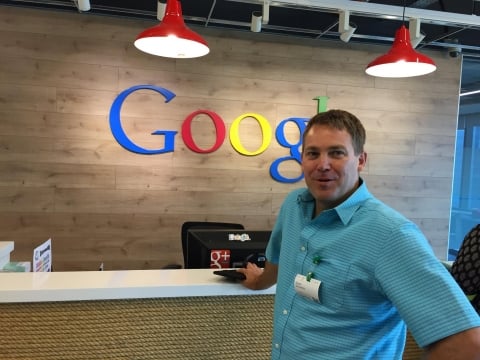
13 years
Many thanks! We are in the process of buying a hostel and we are sure to try this method of marketing. We will let you know how it works out.
EyeForTravel did a piece on how Wyndham Hotel Group is trying to keep guests on their own websites instead of letting them wander off to a third party booking portal. They came up with a good idea. It would be nice if hostels' mobile websites could do this too.
“Since so many of our guests drive to their lodging destinations, we have made a significant investment in developing our mobile websites,” Gaston says. These were specifically designed to complement the unique look and feel of each brand while delivering less clicks and fast booking with an express book feature that allows consumers to reserve a room without the use of a credit card.
Backpackers may not drive their cars to your front door, but they may book while en-route to your city on a bus or a train. If it’s easier to book on your mobile site than on someone else’s, then you’re more likely to get a direct booking, right?
Do you think guests who book on mobile devices are less likely to no-show than guests booking through other channels?
Wyndham ‘s other efforts to keep their customers on their own sites include:

13 years
Many thanks! We are in the process of buying a hostel and we are sure to try this method of marketing. We will let you know how it works out.

13 years
I'm undecided about the widgets that things like hostelworld and tripadvisor offer - while they seem nice, they always are clickable, which takes the customer away from your website. (as you mentioned). Plus if you get a bad review, do you want that automatically coming up on your homepage. Obviously if you only ever get positives that's not a problem, but having a negative as something that your customers see on your own website seems risky to me.

13 years
There’s one school of thought that says displaying the negative reviews on your site shows that you are honest and transparent, and you will be rewarded for it with more bookings. :rolleyes: That school of thought comes from people whose livelihood is not potentially jeopardized by every bad review. I think it’s just as likely that posting them on your site will bite you in the ass.
All of us who work incredibly hard to ensure our guests’ satisfaction know that no matter what you do or how great your hostel is, you simply cannot please everyone. Sadly, we also know that the comments of those few unsatisfied people carry entirely too much weight when a potential guest is considering whether or not to book. Personally, I would not want to broadcast their negative sentiment on my own site.

13 years
I'm undecided about the widgets that things like hostelworld and tripadvisor offer - while they seem nice, they always are clickable, which takes the customer away from your website.
That's why I don't like them. Those widgets take people from your own website and send them to a website where they can choose other hostels (or hotels). And even if they choose your hostel on the other site, you will pay a 10% commission instead of the 2.5% commission (Backpack Online) or no commission.
I wouldn't link to booking websites from a hostel website. If you are given an "award", I would post the award, but not link to the other site.

13 years
I'm stuck on the bookings without using a credit card...no way, no how. back in the day before that became standard you would just end up with empty beds...
also - no widgets...that's just helping send them away to book! the click on the review, hopefully like what they read...will then back click? no! they'll book where they are...

13 years
I agree with many of the comments here. 1. Do not put things on your website that take them away from your website. 2. Put content in your website that keeps them on your website. 3. Taking bookings without commitment from the guest like a credit card debit is a big risk.
Reviews are important but you have to be able to remove those that can ruin your day, week, month. Be honest with other review comments like - The trees don't have leaves in winter, I did not get to eat five breakfasts because others were missing out.
But the most important thing is to get people to your website in the first place.
Google Adwords that capture searches and then post your ads in their search results is a common way to get people to your website. But one click on the add can cost around $4. It all depends on what the competition are paying and the quality of your website. Yes Google will make you pay more for clicks if you have ignored the technical quality of your website.
So fix the technical aspects of your website (Which we advise for free to our users) and get every phone calling guest, emailing guest etc to go to you website. How? For What Reason? See This Film
Every click from a potential guest means you do not have to pay $4 to an search engine like Google.

13 years
Mobile bookings without a CC definitely seems risky, but worth a try, especially if you can play with certain variables like (the first one that pops into my mind) hours left to begin date of reservation. So, (for example and argument's sake) mobile CC-less bookings would only be enabled for a last minute booking. The idea would be that the guests are in more of a rush and probably just want to seal the deal and go to your hostel? However, enabling it for all bookings definitely sounds like it would attract too many no-shows. Worth exploring though... Going to put it on our dev todo-list :)
Wrt TripAdvisor comments, you should probably control the css/design of the TripAdvisor box to keep with your site's design, which would also help lose your guests' urge to leave your site to TA. Seeing one of those TA branded boxes definitely stands out too much and calls one to click away to TA.. For the negative comments, it seems reasonable that you should be able to filter the ones you want to appear on your site. Like showing only positive ones :) or ones that do not contain the word or phrase 'X', etc. That should at least help you weed out the really ugly ones if you've got 'em :(
-Tim
www.bananadesk.com/

12 years
HostelOffice mentioned in another thread that hostels don’t do enough to develop the quality of their own website.
The better the quality of individual hostel websites then the more aggregation sites will have to pay for their [Google] ranking. Hence the desire to force hostels for allocation parity on their own websites. There are very overt and clear methods and tools hostels can use to give their website a turbo charge. But history has shown that individual hostels will pay more attention to the quality score of their aggregation site content rather than the quality score of their own website.
GuestCentric just put out this article with suggestions for driving visitors to your website.
10 simple measures to increase your direct website traffic
Hotels have to be able to stand on their own, especially if they are relatively small and have little brand recognition. The Internet is a level playing field, but it is also very crowded and noisy., If hoteliers don’t have a multi-channel digital marketing strategy, they will have a great difficulty being noticed, and will consequently be dependent on Online Travel Agents like booking.com.
Hoteliers not only need to have potential customers land on the hotel’s own website: they need a website which is an attractive enough channel so as to guarantee that customers will actually book their stays instead of booking through other channels.
The advice from the article:
1. Truly best available rate
The best prices available online should be available on your website.
Other websites and services can very well provide the same prices as well, but you should not be at a competitive disadvantage on your own website.
2. Better pricing on your booking engine
Dynamic pricing is about offering promotions and special offers, for instance, to returning customers and to particular consumer with your booking engine.
3. Good looking, optimized, website
Remember to make sure your hotel website reflects the experience and values of your brand and property, it’s easy to navigate, prominently displays your pictures and engages visitors to book.
4. Creating backlinks is not that difficult
Remember to list your hotel in the several websites available out there. Not only should your listing have the basic contact and location information, they should also have your URL.
To get you started:
10 Free Places to List Your Hostel Online
10 More Free Web Directories for Hostels
5. Social back links
It is important to have an engaging page in the most popular social media websites. Having a good page on Facebook and Google+ as well as a Twitter feed can go a long way towards presenting customers with a positive idea of the hotel and increasing your online presence.
6. Leverage niches
Looking to just stand out on your locations search results (i. e. “hotels at XYZ”) is terribly expensive and might even be prohibitive in costs. Instead, you should focus on markets that have more to do with your hotel. This could mean, for instance, posting your hotel in listings especially suited to your market segment or aiming at more niche markets in your SEO, e.g. activities around your hotel like horse-back riding or paragliding (e.h. “hotel paragliding French alps” or “surf center Algarve”).
7. Attack multiple languages
It is especially important for hotels in Europe to be available online in multiple languages, as their customers don’t just come from their own country (or even from countries with the same native language).
8. Optimize for mobile devices
In a study conducted by GuestCentric with over 300 hotels, a whopping 60% of smartphone bookings were for same night or next night stay.
Optimally, your website should have an optimized version for both smartphones and tablets.
9. Reuse offline content
You have guests that found your hotel. That is the optimal opportunity to ask them what information could have helped them prepare for their trip and, overall, enhance it. This not only gives you the knowledge necessary to make posts for future guests to find your hotel, it also gives you important knowledge for your staff to be aware of when helping them in the future.
Furthermore, there are other things that you can take advantage of. For instance, if you make brochures for your hotel and/or the surrounding locations and activities, then make that content available online.
10. Have your pictures labeled properly
By having your pictures titled properly you can make sure that potential customers will see your hotel. This is especially important with Google’s attempts to show immediate answers to queries. Take for example how the search for “Tivoli Sao Paulo” will have the results with a picture of one of the hotel’s rooms on the side.

12 years
Not sure if this is obvious but if you are going to have links to other websites that the guest may be able to book through (eg. tripadvisor, HW etc... or really any site now that i think about it) then make sure they open in a new tab/page. I hold CTRL almost every time I click any link anywhere, because I hate having to navigate backwards and forgetting where I was on the original page, but for the purpose of our discussion here it means people can see other sites without actually leaving yours.
Seriously, I hate links that take you to new websites without opening a new window, if its a different page on the same site, thats ok of course. but otherwise...

12 years
Not sure if this is obvious but if you are going to have links to other websites that the guest may be able to book through (eg. tripadvisor, HW etc... or really any site now that i think about it) then make sure they open in a new tab/page.
This is a tough one for webmasters, because whether a link opens a new tab or new window depends on the browser, not the website. Webmasters add code that says target="_blank" to a link and then the browser decides what to do with it. The behavior of a link isn't consistent across different computers and devices.
Usability studies show that opening new tabs/windows actually confuses users and increases the "cognitive burden" (in general). On the other hand, there are many users who hate it when the links don't open in new windows.
It's getting even more complicated now, because there are so many devices and browsers that behave differently based on on the same HTML code.
There are also technical challenges with opening all external links in new tabs/windows, especially on sites where users create the content.
What I do on my own sites is keep all links opening in the same window. If the website tells browsers to open links in new tabs/windows, the users can't control their browsers any more. If it opens links in the same window, the users can choose with these standard keyboard commands:
(and more)
The Nielson Norman Group does a lot of studies about user interface design and they recommend opening links in the same window, with a few exceptions:
I think that it's impossible to make everyone happy with the way links are opened. I used to get frustrated when websites would open links in new windows, since I have a certain method of browsing sites and it would take away my control of the browser. Now I just use ctrl-click (plus ctrl-w) and shift-click for every single link in order to avoid any frustration from unexpected behavior from sites. I think the use or non-use of target="_blank" has become so fragmented that no one will ever be happy unless they take control of their own browsers with those two keyboard shortcuts. :)
I'd be sure never to link to sites like Hostelworld, Hostelbookers, or Tripadvisor anyway. It just boosts their search engine rankings, making it more difficult for all hostels to get direct bookings. If a booking site gives you an "award" or widget, be sure to remove the links before you put it on your website. :)
Related Pages
Log in to join discussion